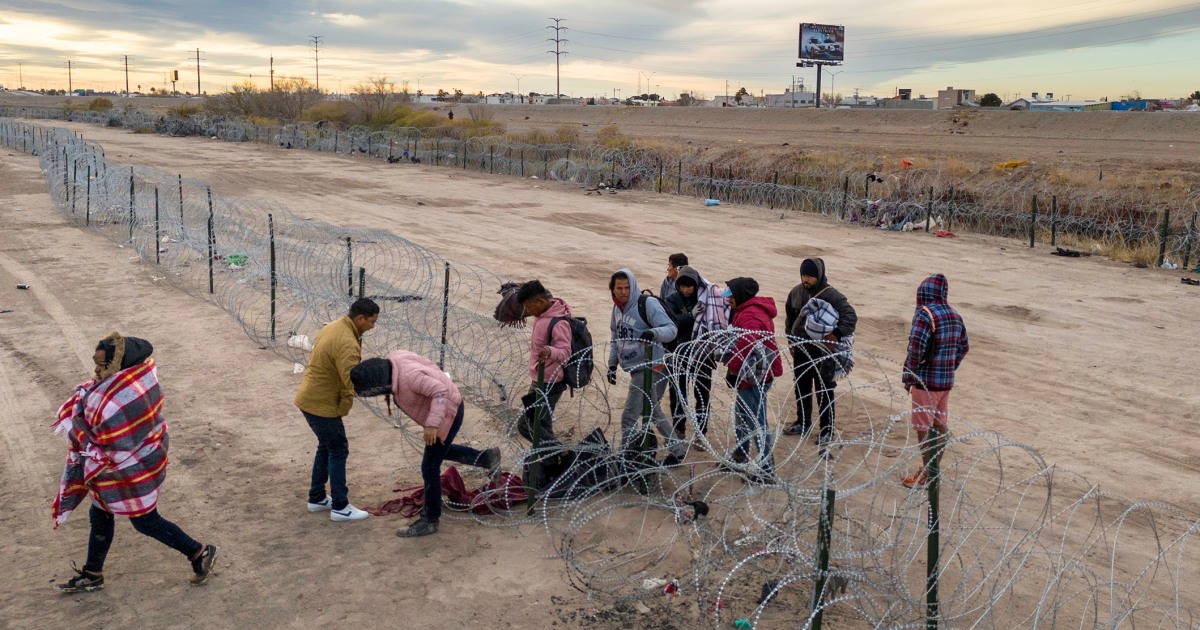Passed in mid-November by the Republican-controlled Texas legislature and ratified a month later by Governor Greg Abbott, SB4 makes it a misdemeanor for a foreigner to “enter or attempt to enter the state from a foreign nation.” irregularly.
Abbott specified, during the law signing ceremony next to the border in Brownsville, that the objective of the measure is to “stop the wave of illegal entry into Texas” so he hoped that illegal crossings at the state lines would be reduced. reduce between 50% and 75%.
“Drug cartels are not going to want to operate in Texas.”
Parts of the law went into effect this Tuesday, February 6, specifically the one that establishes that a mandatory minimum sentence of 10 years will be imposed on those accused of trafficking undocumented immigrants.
But if the crime is considered serious and first degree, the minimum prison sentence amounts to 15 years or more if there is another legal provision that is applicable to the case.
A group of migrants enter El Paso, Texas, from Ciudad Juárez, Mexico, on February 1, 2024 after crossing the Rio Grande.John Moore / Getty Images
The penalty, however, is reduced to 5 years in prison, in the case of people who transport certain close relatives, considered up to the third degree of consanguinity.
Lina Hidalgo, the administrative judge and head of the Government of Harris County, the largest in Texas, expressed her disagreement with the approval of SB4.
In a letter recently sent to the president, Joe Biden, Hidalgo argued that the law is in complete violation of immigration laws that are the exclusive responsibility of the federal government.
“It is unprecedented and even legislators from both sides, Democrats and Republicans, have openly stated that this law is unconstitutional,” the official said in said letter.
The keys to the new law
Who can be arrested?
The law allows any Texas officer to detain people suspected of entering the country without documents.
In order to do so, officers must have probable cause, which may include witnessing a break-in or seeing it on video.
However, SB4 cannot apply to people who are legally in the United States, including those who have obtained asylum or are enrolled in the Deferred Action for Childhood Arrivals (DACA) program.
Where can arrests be made?
Agents can make arrests anywhere in Texas, with some exceptions.
However, Republican state Rep. David Spiller, who introduced the bill in the state House, believes the vast majority of arrests will occur within 50 miles of the state border. United and Mexico.
Among the places where arrests cannot be carried out are public and private schools, as well as churches, synagogues or other established places of worship.
They also cannot take place in hospitals and other healthcare facilities, including those where sexual assault forensic examinations are carried out.
The law allows state justice
to order the expulsion of people without judicial process
.
Texas officials will have the discretion to deport detainees.
What happens after the arrests?
Once apprehended, immigrants may choose to accept a state judge's order to leave the United States or be prosecuted for a misdemeanor charge of illegal entry.
Those who do not leave US territory run the risk of being arrested again and being prosecuted for more serious crimes due to repeat offenses.
SB4 states that those ordered to leave the US will be sent to ports of entry along the border with Mexico, regardless of whether or not they are Mexican citizens.
What would the sentences be?
Previously, helping to cross or transport an undocumented immigrant was punishable by up to two years in prison.
With SB4 this penalty is increased to 10 years behind bars and the payment of a maximum fine of $10,000.
If a detained person is a repeat offender, the penalty could reach up to two decades in prison.
For those who are prosecuted and convicted of operating a house to hide undocumented immigrants, the sentences will have a minimum of five years in prison.
But the penalties will be increased to their maximum if the crimes occur in regions declared disaster zones.
The measure also expands sentences for other crimes committed during immigrant smuggling.
The law provides that those arrested who collaborate with justice in an investigation related to illegal immigration may benefit from having their sentence reduced by half.
With information from
The Associated Press

